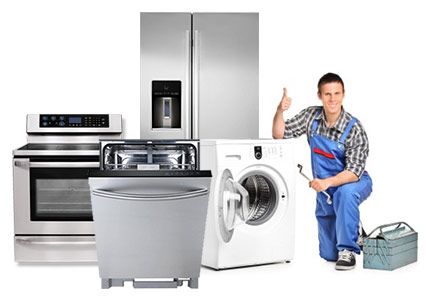The Ultimate Overview to Understanding Appliance Repair Work in your home
When your fridge quits cooling or your stove rejects to warm, it can feel overwhelming. Comprehending appliance repair at home can conserve you money and time. You'll learn to recognize signs and symptoms, make use of vital tools, and follow a systematic troubleshooting procedure. Yet prior to you start, there are crucial security precautions you need to take right into account. What are the most common problems, and exactly how can you fix them? Allow's explore the basics.
Typical Appliance Issues and Their Signs
When your home appliances begin acting up, it's vital to recognize the indications early on. Overlooking them can lead to larger problems and expensive repair work. If your fridge isn't cooling down effectively, you might see warm areas or condensation developing. This could indicate a failing compressor or an obstructed vent.Your dishwasher may show troubles through unclean dishes or unusual noises during cycles. If you listen to grinding or clanking, it's time to investigate.A washing maker that will not rotate or drain pipes can leave you with soaked washing, recommending a stopped up drainpipe or a malfunctioning pump.Lastly, if your stove's temperature seems off or it takes permanently to pre-heat, you could be dealing with a faulty thermostat. By remaining alert to these symptoms, you can attend to issues prior to they escalate into significant repair services.
Necessary Tools for Device Repair Work
When you're dealing with home appliance fixings in your home, having the right devices is vital. Basic hand devices like screwdrivers and pliers will certainly aid you take apart and take care of numerous home appliances, while electric testing gadgets assure you're working safely with circuitry. Let's review what you need to start on your fixing journey.
Basic Hand Tools
Having the right tools is essential for reliable device repair service in your home. Begin with a reliable screwdriver collection, consisting of both flathead and Phillips kinds, as screws prevail in appliance setting up. Pliers are additionally crucial; they assist with gripping, twisting, and reducing wires or tiny elements. A pair of needle-nose pliers can get to tight spots conveniently. You'll require a great adjustable wrench for tightening or loosening nuts and screws. An utility knife comes in handy for reducing via packaging or insulation. Do not forget a tough workbench or surface to securely arrange your tools and parts. With these standard hand devices, you'll be well-prepared to deal with most home appliance repair services that come your means.
Electric Screening Tools
Together with standard hand tools, electrical testing devices play an essential function in appliance repair service. These devices assist you detect electric problems and guarantee devices function securely. A multimeter is vital; it determines voltage, current, and resistance, enabling you to identify issues quickly. A non-contact voltage tester is one more essential, allowing you detect real-time cords without making direct get in touch with, improving your security. Clamp meters are excellent for gauging current circulation in cords without detaching them, saving you effort and time. Furthermore, circuit testers can promptly inspect if electrical outlets are functioning effectively. By utilizing these gadgets, you'll streamline your troubleshooting process and improve your repair work skills, making device maintenance a whole lot much easier.
Step-by-Step Guide to Diagnosing Appliance Issues
When your appliance breaks down, it can be aggravating, however identifying the problem doesn't need to be frustrating. You'll discover to determine typical troubles and use efficient repairing techniques. Let's go through the steps to get your device back in functioning order.
Common Appliance Problems

Fixing Methods Described

Repairing Significant Kitchen Appliances: A Closer Look
Have you ever before asked yourself just how to deal with typical concerns with your kitchen area devices? Repairing major kitchen devices like fridges, stoves, and dish washers can be simpler than you think. Begin by identifying the problem-- whether it's a fridge not cooling or an oven that will not warm. Often, a straightforward reset or inspecting the power source can resolve the issue.For refrigerators, tidy the condenser coils and inspect the door seals. If your stove's not home heating, inspect the home heating component and thermostat. Dish washers could just need a clean filter or a reset to obtain them back in action. Always disconnect the home appliance prior to diving right into repair services to ensure your safety.Don' t fail to remember to consult the customer manual for specific fixing suggestions connected to your model. With a little bit of perseverance and the right tools, you can confidently take on home appliance repair work and conserve money while doing so!

Troubleshooting Laundry Equipments: Tips and Techniques
When your washing appliances start acting up, it can really feel overwhelming, however repairing them doesn't have to be a trouble. Beginning by inspecting the power supply. Confirm the device is connected in and the outlet is working. Next off, inspect the door or cover button; a malfunctioning switch can prevent the device from operating.For washing machines, if it's not spinning, look for unbalanced tons. Redistributing the clothes could solve the concern. If your clothes dryer isn't home heating, tidy the lint filter and examine the air vent for blockages.Listen for unusual noises; they can show an issue. If your appliance is leaking, check the hoses for cracks or loosened connections. Paper any type of error codes shown on electronic displays, as they can assist you in determining the concern. Seek advice from the individual manual for particular fixing ideas associated to your model.
Safety And Security Precautions to Take Throughout Repair works
Prior to you begin any type of appliance repair work, it's necessary to focus on security to avoid crashes or injuries. First, unplug the device or transform off the breaker to assure no power reaches it while you work. Usage shielded tools to reduce the threat of electrical shock. Wear security goggles and handwear covers to safeguard yourself from sharp edges or debris (Washer dryer repair service Dependable Refrigeration).Make specific your work space is clean and well-lit, so you can see what you're doing. Keep kids and animals away from the location to prevent interruptions and possible risks. If you're dealing with gas home appliances, be extra careful; look for leaks before proceeding.Take your time, and do not rush via fixings. If you really feel unclear about any action, it's much better to stop briefly and research study than to presume. Complying with these safety measures will help create a safer setting for your do it yourself appliance repair work task
When to Call a Specialist for Aid
Exactly how do you understand if it's time to call in a specialist for device repairs? If you've attempted standard troubleshooting without success, it's a clear indication. For example, if your home appliance still will not begin or reveals unusual noises after resetting it, do not wait to seek professional help.When you notice leakages, smoke, or melting smells, prioritize safety and security and call a professional immediately. These concerns can bring about more significant damages or present threats to your home.Also, if your device is under service warranty, contacting an expert is frequently the very best route. They can guarantee that repair work will not void your warranty, conserving you money in the long run.Finally, if you're not sure or unpleasant with complex repairs, it's a good idea to leave it to the specialists. Remember, taking on complex problems without the right expertise can result in expensive mistakes. Trust an expert when unsure!
Regularly Asked Concerns
Just How Can I Prevent Appliance Troubles in the Future?
To avoid home appliance troubles in the future, you must execute regular maintenance, look for damage, tidy filters, and stay clear of overloading. Remaining aggressive will help prolong their life expectancy and keep them running smoothly.
What Are the Most Usual DIY Appliance Repair Work Mistakes?
You could ignore safety and security preventative measures, skip repairing steps, or make use of incorrect tools when trying do it yourself home appliance repair work. Hurrying the process or overlooking manufacturer standards can lead to even more considerable concerns and expensive mistakes. Stay client and notified!
Exactly how Do I Know if a Component Needs Replacement?
You can tell if a part requires substitute by looking for uncommon sounds, leakages, or irregular performance. If the appliance struggles to run appropriately or shows visible damage, it's likely time for a replacement.
Can I Use Generic Parts for Device Repair Works?
Yes, you can utilize common components for device repairs, but ascertain they work - Washer dryer repair service Dependable Refrigeration. Common parts might save you money, yet they could influence performance or durability, so evaluate your alternatives meticulously before deciding
What Warranties Cover Home Appliance Repairs?
Most appliance service warranties cover repair work for producing defects, however they commonly leave out damage from misuse. Check your warranty terms thoroughly, as some might require using certified professionals and initial components for protection to continue to be valid.
Comments on “Refrigerator Troubleshooting Checklist – Dependable Refrigeration & Appliance Repair Service Washing Machine Repair”